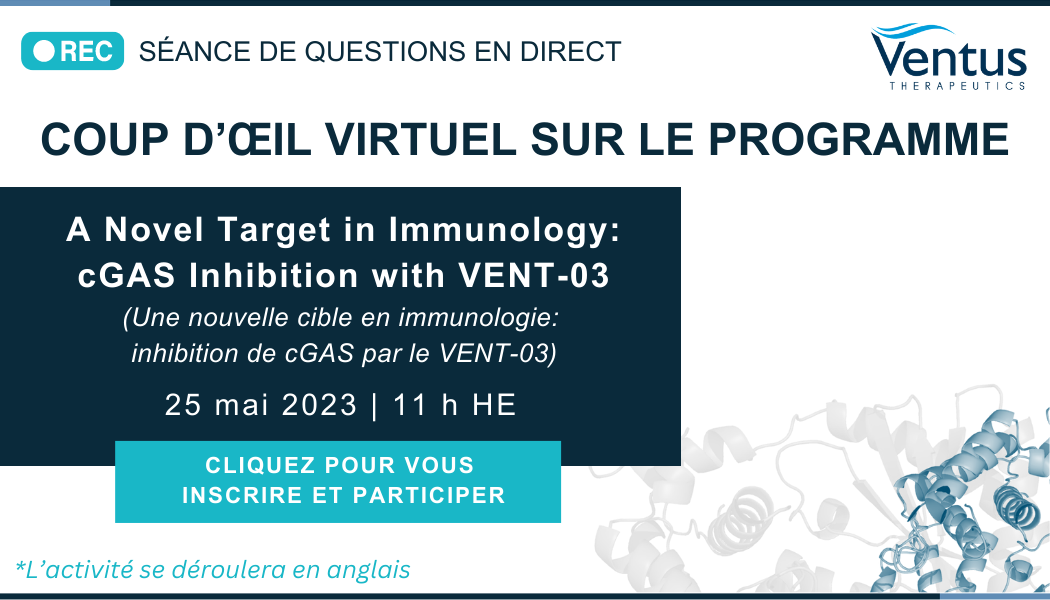Ventus’ cGAS inhibitor to be studied as potential lupus treatment
WALTHAM, Mass. & MONTREAL, QC – May 9, 2022 – Ventus Therapeutics, Inc., a biopharmaceutical company utilizing structural biology and a proprietary computational platform to identify and develop small molecule therapeutics across a broad range of diseases, announced today that it has been awarded a Lupus Research Program Idea Award from the U.S. Department of Defense (DoD). The multi-year grant will be used to study the role of the DNA sensor, cyclic GMP-AMP synthase (cGAS), in lupus and the potential for treatment using a cGAS inhibitor.
“It is estimated that over five million people worldwide have a form of lupus, and Ventus’ cGAS inhibitor may provide a new treatment option that avoids the risks of broad immune suppression,” said Michael Crackower, Ph.D., Chief Scientific Officer of Ventus, who will serve as the principal investigator for the DoD grant. “We are honored to receive this grant from the DoD in recognition of our innovative research on the complex etiology of this disease and advancement of new potential treatments towards the clinic.”
Systemic Lupus Erythematosus (SLE) is a chronic multi-organ auto-inflammatory disease for which there remains a high unmet medical need. One of the many complications of SLE is hypersensitivity to sunlight, especially ultraviolet B (UVB) wavelengths. This susceptibility affects up to 70% of patients and can result in painful skin lesions that cause scarring, hair loss and discoloration. While the etiology of SLE has been linked to multiple genetic and environmental factors, aberrant accumulation of DNA and elevated levels of type I interferons are believed to play central roles in its pathophysiology. As a sensor of DNA, and an inducer of Type I IFNs, cGAS has emerged as a therapeutic target of high interest for SLE.
“It has been gratifying to work with the Ventus team using their unique technology to create small molecule inhibitors of cGAS,” said Thomas Tuschl, Ph.D., Professor of RNA Molecular Biology at The Rockefeller University and co-investigator for the DoD grant. “cGAS is a well-validated target that has been very challenging for drug discovery.”
“We are focused on meeting the desire of patients to have access to an oral or topical therapeutic that can control the symptoms of cutaneous lupus and improve their quality of life,” said Kelly Pike, Ph.D., lead biologist of the cGAS program and Head of Translational Sciences and Scientific Affairs at Ventus and co-investigator for the DoD grant. “Using our ReSOLVE platform, Ventus has solved the high-resolution co-crystal structure of cGAS in the presence of novel binding compounds, has identified novel, highly selective and optimized cGAS functional inhibitors, and is working to bring them to the clinic.”
About the Lupus Research Program
The Lupus Research Program (LRP) was initiated in 2017 to provide support for research of exceptional scientific merit leading to a cure for lupus. The LRP’s mission is to fund research to understand, prevent, and diagnose lupus and to improve treatments and quality of life for patients, including service members, veterans, and beneficiaries. The LRP Idea Award supports innovative, high-risk/high-reward research that could ultimately lead to a critical discovery or major advancement relevant to lupus.
The sharing of any non-DOD information does not constitute an endorsement of contents on the part of the DOD.
About cGAS
cGAS is an intracellular pattern recognition receptor that is activated after binding to double-stranded DNA (dsDNA) in the cytoplasm. dsDNA in the cytoplasm is generally associated with cellular dysfunction, as seen in multiple diseases such as dermatomyositis (DM), cutaneous lupus erythematosus (CLE) and SLE. cGAS activation leads to cGAMP formation, activation of STING and downstream expression of type I interferons such as IFN-α, -ß and -κ, leading to pronounced inflammation and tissue damage. This pathway also leads to the expression of several other proinflammatory cytokines such as CXCL10. Genetic mutations that lead to the aberrant activation of cGAS/STING in humans are known to cause severe infant onset Aicardi-Goutières Syndrome, or AGS, and genetic forms of chilblain lupus, demonstrating the relevance of the pathway in human diseases. Given that the pathophysiology and presentation of these genetic diseases have significant similarities with idiopathic complex diseases such as DM, CLE and SLE, these diseases represent highly compelling opportunities for treatment with a cGAS inhibitor.
About Ventus Therapeutics
Ventus Therapeutics is a biopharmaceutical company utilizing structural biology and computational tools to identify and develop small molecule therapeutics across a broad range of diseases, with an initial focus on immunology, inflammation and neurology. We have developed a proprietary drug discovery platform, called ReSOLVE, which is built upon our structural biology and protein science expertise and our proprietary computational chemistry capabilities, to address the current limitations of small molecule drug discovery. We are leveraging our ReSOLVE platform to discover and characterize previously unknown or poorly understood pockets on the surface of proteins and identify small molecules that can bind to those pockets with optimal affinity. We are focused on high-value targets that have been extensively implicated in human diseases but were previously considered undruggable or where we believe there is a significant opportunity to improve upon existing therapies. Our lead programs target key innate immune modulators, including NLRP3 and cGAS. For more information, please visit www.ventustx.com and engage with us on Twitter @Ventus_Tx or on LinkedIn.
Forward-Looking Statements
This press release contains forward-looking statements about future expectations, plans and prospects, including, but not limited to, statements related to our ability to identify and develop small molecule therapeutics across a broad range of diseases, cGAS’ potential to effectively treat lupus and our cGAS inhibitor’s ability to provide a new treatment option that avoids the risks of broad immune suppression, our future results of operations and financial position, business strategy, prospects, our current programs, planned and ongoing preclinical studies and clinical trials, research and development costs, regulatory approvals, timing and likelihood of success, as well as plans and objectives of management for future operations. These forward-looking statements are based on our current expectations and inherently involve significant risks and uncertainties. Actual results and the timing of events could differ materially from those anticipated in such forward-looking statements as a result of these risks and uncertainties, which include, without limitation, the initiation, timing, progress and results of preclinical studies of cGAS and its ability to treat lupus; the results of our earlier studies not being predictive of future results; our ability to obtain funding for our operations and implement our business strategy; our ability to meet regulatory standards, including any anticipated regulatory developments in the United States and foreign countries in which we may seek regulatory approval for our future product candidates; the impact of the COVID-19 pandemic on our business and efforts to address the impact on our business; anticipated developments related to our competitors and our industry; and the performance of third-party service providers, including suppliers and manufacturers. Any forward-looking statements contained in this press release speak only as of the date hereof, and we undertake no duty or obligation to update any forward-looking statements as a result of new information, future events or otherwise.


